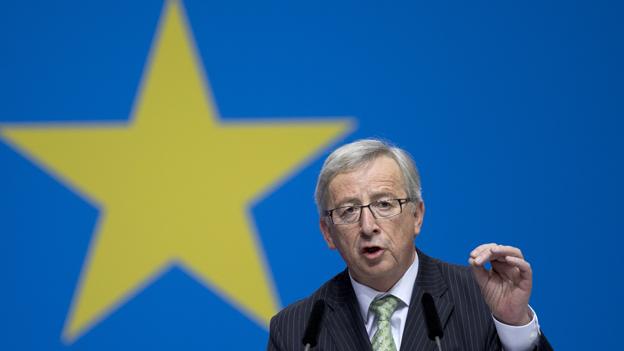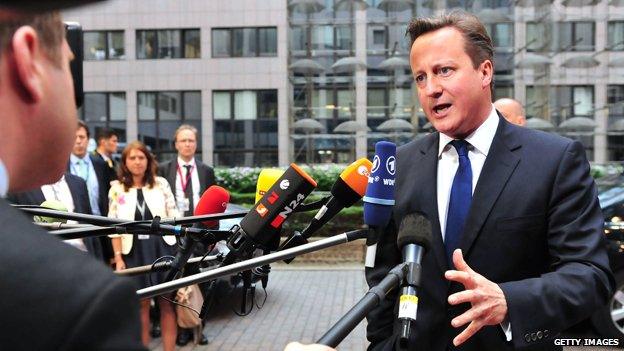Juncker as good and bad for the UK
- Published
- comments

The eurozone's most serious flaw, many would say, is the absence of a political union to underpin and reinforce economic and monetary union.
It's why even during and after the recent existential crisis, the eurozone has struggled to put in place wholly binding checks on the ability of member states or their banks to hold the rest of the currency union to ransom through their reckless conduct.
The point is that banking union (a common, adequately financed approach to supervising and rescuing banks) and fiscal union (controls on taxing and spending by member states), which are both seen as necessary long-term foundations of monetary union, erode national sovereignty.
Or to put it another way, the narrower interests of the nation state, the exercise of national sovereignty, have routinely watered down reforms to forge a banking and fiscal union, such that it is still not possible to be confident that the euro is forever.
If only the eurozone's central decision-making institutions had democratic legitimacy, then eurozone sovereignty might trump national sovereignty - and the euro could live happily ever after.
Surely what the eurozone needs therefore is to become a federation, a United States of Europe, in which it would be natural for the resources of the citizens of one part to be deployed to bail out the citizens of another part - because eurozone citizens would feel a mutual solidarity based on a sense that they all had a voice and influence over the future of the currency union.
Which takes us to why it matters that the elected European parliament is insisting on its new right to nominate the president of the European Commission, and kill the tradition that the holder of this powerful position should be chosen by unseemly horse trading between EU government heads.
The parliament's lead candidate for the presidency, or Spitzenkanditat, is the individual chosen by the political grouping that performed best in the recent European elections.
In that sense Spitzenkandidat Jean-Claude Juncker is the embodiment of an attempt to show that voting in the European elections is not just a protest against unpopular national governments or an EU that some see as meddlesome, but will actually determine how the EU is run.
Which sounds a bit like a European spring, an unleashing of democratic forces on the European Union's executive body (don't snigger please).
Or to put it another way, the row about whether the former Luxembourg premier should be the next Commission president is only in small measure about whether his face and politics are attractive to David Cameron.

It is about whether the EU should evolve into something that looks a bit more like the USA, in respect of its political structures and governance, or whether it should remain a rather looser agglomeration of nation states.
Here, of course, you will note an elision that is so toxic to the UK prime minister.
He would agree that the eurozone needs to become more politically integrated to thrive. However he would point out - perfectly properly - that the eurozone and the European Union are not the same.
The problem of course is that there is no easy institutional way to give the eurozone more democratic legitimacy while not simultaneously democratising the European Union as a whole.
And the last thing David Cameron needs right now, with UKIP so rampant in Tory heartlands, is any sign that the EU is claiming an enhanced legitimacy and right to interfere in the affairs of the UK.
Or to put it another way, building a eurozone for the long term - something which the UK would want, because it would bring stability to our most important overseas market - seems inimical to the British government's hopes of tilting the balance of power back to Westminster and away from Brussels.
The tussle between Germany and Britain over Juncker's appointment is a battle for the EU's soul.